QuestionQUESTION: Hi Sandra,
My 1.5-year-old ratty, Sofia, just had a golf-ball-sized tumor removed from
her uterus. The vet who did the surgery was wonderful and Sofia made it
through the night. I just picked her up about an hour ago but our normal vet
(the one who did the surgery) was not there. I talked to another vet about
Sofia's post-op care, but he was not an exotic vet and did not know how to
answer many of my questions. I was hoping you could shed some light on a
few of them so that I can provide the best care for Sofia.
1. She has been licking/chewing at her stitches. Her incision was closed with
soluble internal sutures and then glued shut, but I still worry that she will be
able to get in there. How much licking/biting is normal after surgery?
Should I let her lick her stitches at all? If not, how can I prevent her from
getting at them?
2. She was given some pretty heavy pain meds last night and then again this
morning, but I was not given any pain medication for when her last dose
wears off. What can I do for her if she is in pain when her medication wears
off?
3. The vet who talked to me this morning told me that I cannot let her be
with her cage-mates for over a week because they may be prompted cannibalize her because of her open wound. She wants nothing more than to
see her twin sister Sasha (who has been worried almost to death since Sofia
left for the vet). When I take Sofia out of her medical cage, she will make a
headlong dash for her regular cage. I tried putting her medical cage next to
her regular cage, and she calmed down a lot, but it is heart-breaking to see
her huddled up against the bars across from her sister, trying to cuddle.
When can I put them back together? Can I put Sasha in Sofia's cage sooner
than a week?
4. The tumor that was removed was attached to her colon, bladder and had
grown into her vagina. The vet who did the surgery said that she tried to get
every last little bit of the tumor but had to be very careful around Sofia's
bladder, so some of the tumor tissue may have been left behind. If this is
the case, will Sofia need another operation soon? Will left-behind tumor
tissue definitely turn into another tumor? If so, does she even stand a chance
of surviving through a second operation?
5. Should Sofia's twin sister Sasha be spayed as a preventative measure? I
know that spays carry some risks, but since these two are identical twins, I
suspect that Sasha may have a similar medical future and also develop a
uterine tumor. Do the benefits of spaying a 1.5-year-old rat outweigh the
risks?
6. Sofia has been peeing A LOT - far more than I have ever seen her pee
before. Is this normal? Could it be a sign of something wrong internally?
7. Finally, how much activity/handling is okay after a surgery like this one?
Sofia begs for attention, and was even trying to climb the bars of her medical
cage. Is it okay to take her out on the couch and let her roam around? Can
she hurt herself if she pushes herself?
Thank you so very much for any help you can give me. I am sure Sofia is
grateful too :)
ANSWER:
1. She has been licking/chewing at her stitches. Her incision was closed with soluble internal sutures and then glued shut, but I still worry that she will be able to get in there. How much licking/biting is normal after surgery?
ANSWER:
Licking is ok, biting it is not, but she may not be biting through and just cleaning it. Is she making it bleed or making it loosen up at all? I assume there are no visible stitches if they were dont internally which I prefer.
Should I let her lick her stitches at all? If not, how can I prevent her fro getting at them?
ANSWER: its ok to look as I said above. There is no real way to stop her other than an E collar which makes the rat stress so much it can hinder healing. A few days of closely watching her and she should be fine. Usually though, they only fuss with it if its hurting her which I see now is another question you have about pain meds...
2. She was given some pretty heavy pain meds last night and then again this morning, but I was not given any pain medication for when her last dose wears off. What can I do for her if she is in pain when her medication wears
off?
ANSWER: What was the name of the pain medication she was given? Was it a narcotic? Usually my rule is that they should have some pain relief because this keeps them comfortable and they leave the source of the pain alone, which is the surgical site. I would call the vet for more if you can. Giving ibuprofen after surgery can promote bleeding so thats not a good idea or I would suggest using childrens ibuprofen, but thats out, so I would call the vet if you can. In fact, if they are closed, they can have you go to the local animal ER to pick up a script for it. There is no reason they cant do that for you if they are closed, which I assume they are unless they are a 24 hr care place. Did she spend the night there at the clinic after surgery?
3. The vet who talked to me this morning told me that I cannot let her be with her cage-mates for over a week because they may be prompted cannibalize her because of her open wound.
ANSWER: The vet is totally of his rocker! LOL! I have NEVER EVER EVER heard of this, had it happen to me or other rats, not ever. Like you said, he has no clue about rat care, obviously, and doesnt have a clue about the bond they have with cagemates. So therefore, I erased the rest of the question because you absolutely CAN put her with her sister NOW if you want, but keep an eye on them to see how they act. She will want to sniff her no doubt but she will probably shoo them away anyhow. You can put her sister in the hosptial cage right now if you want. In fact if it makes you feel better, there are other experts who agree with me that its best they are with their cagemate (S) so they are not stressed. Again, stress hinders healing. I had a rat that had to have his eye removed and I brought his brother with him to the vets so when he woke from surgery he was not alone. They spent the night at the vets together and his brother did nothing but watch over him. In fact he bit the vet when the vet went to take Santana out to check how the surgical site looked. Socrates did not want anything to happen to his brother and understood that there was something going on with him so he was watchful. It was amazing how they were so bonded. About a week later, Santana sat there motionless as Socrates pulled the stitches from his eye. I was going to remove them that evening anyhow since the eye was fused shut and the threads kept coming loose, but Socrates beat me to it. He never touched his brothers eye other than to gently groom around it, but once he saw the threads loose, he went for it. LOL
4. The tumor that was removed was attached to her colon, bladder and hadgrown into her vagina. If this is
the case, will Sofia need another operation soon?
Answer:
I am going to assume she was not spayed? If not, I am curious why she wasnt?
Will left-behind tumor tissue definitely turn into another tumor? If so, does she even stand a chance of surviving through a second operation?
If she is strong and healthy, she could survive another surgery, but again I need to ask first if she was spayed at the same time. The chances of it growing back are there, yes, but its about a 20% chance which isnt too bad really. I had a female have a tumor removed at 3 years old from her uterus and they did an emergency spay. She did very well and lived another 6 months!
5. Should Sofia's twin sister Sasha be spayed as a preventative measure? I
know that spays carry some risks, but since these two are identical twins, I
suspect that Sasha may have a similar medical future and also develop a
uterine tumor. Do the benefits of spaying a 1.5-year-old rat outweigh the
risks?
ANSWER: This is a tough one. Chances she develop the same tumor are slim, but mammary tumors are a factor when a rat is not spayed. Usually its best to spay them under 6 months old to prevent mammary tumors. If her estrogen levels are already starting to rise, usually around menopause which is around 18 months but could be sooner, mammary tumors are almost always expected to develop. That doesnt mean she has to die, however, as these tumors can be easily removed and are nothing half as invasive as spaying or abdominal surgery like her sister had, which carry risks for many reasons. I hate to say to spay her when at this age it may not change the path that the mammary tumors may still take and risking her life to prevent something that still can happen (chances are still around 50-50 , maybe even 60%) so if it were my rat? No, I would not spay her now but would opt for tumor surgery if and when they occur. They are super easy to remove, imagine peeling a potato which sounds weird, but its that easy, really.
I guess I will say that no, the benefits dont outweigh the risks, not at this age.
6. Sofia has been peeing A LOT - far more than I have ever seen her pee before. Is this normal? Could it be a sign of something wrong internally?
ANSWER: As long as the urine is clear, dont worry. They probably gave her fluids. Is she drinking much?
7. Finally, how much activity/handling is okay after a surgery like this one?
Sofia begs for attention, and was even trying to climb the bars of her medical
cage. Is it okay to take her out on the couch and let her roam around? Can
she hurt herself if she pushes herself?
ANSWER:
If she feels like moving, she will move. Rats are tough as nails, but I would not want her to stretch her belly and rip her sutures so keep her from jumping and climbing best you can. I think once you put her sister with her, she will snuggle and sleep and wont be as anxious. You can hold her, but I would avoid the couch just in case she fell or tried to jump. You can let her roam on the floor if you have a safe area for her.
Have you read my critter city site? I have tons of stuff that you may like to read about, esp about mammary tumors and prevention etc...along with photos and stories of rats that people write to me about. Also, on the GETTING STARTED page I have a cool idea I found from THE DAPPER RAT on how to construct a cardboard wall to use as a safety barrier during play time for the rats. This way they can stay on the floor in a rat safe area and you can make it as big as you want. I extend mine all around the entire rat room, open the cage door and out they come. Right now, sadly, I am ratless. I lost my last boy, the one with only one eye, three weeks about at 33 weeks old. Tomorrow I am picking up three tiny baby boys from my breeder and starting all over again, so its bittersweet. I have a huge 4 foot cardboard "wall" all ready to go for these babies that I am sure are going to be jumping all over the place like crazy! Check out the page on my site ABOUT ME to see photos of my babies I am getting plus my beloved past rats I have loved and lost over the years.
Here is the URL:
http://www.freewebs.com/crittercity/index.htm
Please get back to me about if she was spayed during the surgery and also about the name of the pain meds she was given. Was she given antibiotics? I would think she was since she had such an invasive surgery.
---------- FOLLOW-UP ----------
QUESTION: Thank you for the extensive reply! I feel much more at ease now :)
Yes, she was spayed during the procedure. The huge problem was that the
tumor had grown through her abdominal wall and attached itself to her
organs. It had grown around her bladder and the vet tried to remove it as
best she could, but could not be sure that she got all of it. She felt it was
best not to risk damaging the bladder. So would the odds still be as low as
20% if the tumor tissue was left on Sofia's bladder? Will she develop bladder
cancer? (I am not sure if the tumor was cancerous or not, but I don't think it
was. I'll ask my vet at our follow-up).
Sofia was being given butorphanol (torbugesic) while she was in the ICU and I
just called the vet and got her some metacam. I haven't given her the
metacam because everything I've read about it says that it is not to be given
within 24 hours of any other pain medication. Is this true? She seems to be
doing okay right now, but if she does start to look like she's in pain, is it okay
if I give her the metacam? I have little .05 mL doses of it in needle-less
syringes. Can I give it to her with food or do I have to force-feed it to her (oh
please say that I don't have to force feed her...) She did spend the night at
the vet, and I did not get any sleep! I kept calling checking up on her - they
probably thought I was crazy. Finally, around 2:00 AM, the night nurse snuck
me in past the surveillance cameras so that I could visit with Sofia a little bit.
It was very nice of her to let me do that :)
I am supposed to give her 0.2 mL Clavamox twice a day for 5 days. She was
already on Doxy and Baytril for a mycoplasma flare-up before the surgery,
but the vet said that she cannot continue to take those medications with the
Clavamox because they are stationary-phase antibiotics and Clavamox is not.
In light of this, I am wondering if her mycoplasma symptoms will flare up?
Anyway, I put Sofia's sister in with her and they are sleeping right now. They
were so happy to see one another though! Sasha checked up on Sofia, gave
her a little ratty kiss and then immediately started scoping out the cage,
making sure nothing was going to hurt her sister. It was very cute. Sofia is
much more relaxed now that Sasha is with her.
Sofia is drinking fine and the exuberant peeing has abated a little ;) She is
potty trained, so I think she may have been holding it in until she was in a
cage that smelled like herself. The vet was worried about her because she did
not pee while she was there (as far as they could tell.) But she is eating,
drinking and peeing just fine now, though she has yet to take a poo.
One last thing: is there anything I can do dietarily that will help to prevent
tumors in my rats in the future?
Thank you for all of your advice so far. You are truly an invaluable resource!
I have been reading your site for a long time and you have been very helpful
to me in the past as well (you helped me out when my rat Isabelle had a
bladder infection). Once again, thank you.
AnswerSounds like you have a good vet there.......ask her about spaying the other rat, see if her opinion matches mine. I am curious
Also, metacam is fine to use even within a few hours of narcotic medication. All metacam simply is is a glorified ibuprofen. However, using metacam with other anti-inflammatory drugs, such as ibuprofen or corticosteroids but taking them a few hours after narcotics is fine.
As for diets and tumors...they do say the seed mixes are linked to mammary tumors but to be honest, it is estrogen that fuels the growth of these tumors. When the rat stops going into heat, estrogen levels rise and cause the tumors to grow. If the rat is spayed at a young age, usually estrogen levels even out and do not rise so the chances of developing mammary tumors are much lower in spayed rats.
And back to diets...You should feed your rat a nutritious low fat, low calorie diet that includes fresh fruits and vegetables too and avoid high protein as well. Check my website, Critter City, and the page on proper diets for ideas.
Even though the tumors are usually benign they still can cause problems with the rat if left on them. As for spaying Sofia, I had a feeling she was spayed, or at least I had hoped, it would not have made sense if she wasnt when she had the tumor in the spot where it would have been the only answer but TO spay if you know what I mean.
As for clavamox, its fine for preventing infections such as post op infections and urinary tract infections blah blah blah but doesnt help mycoplasmosis one bit. I would ask about getting her back on the right meds for the myco after she starts to recover and get back on her feet.....errrr......paws.....again. It sounds like the vet that did the surgery has her act together (I dont usually pass out alot of compliments when it comes to many vets and rats because I hear more about BAD vet care rather than GOOD vet care, so this is a refreshing change for me to pass out compliments! LOL) I would ask what your vet things about being off the drugs that are for myco. Clavamox is part of the penicillin family and is better for post op infections than baytril is so this is why she wanted to use it instead, but to be honest, she could have used it simultaneously with baytril without any unwanted interactions.

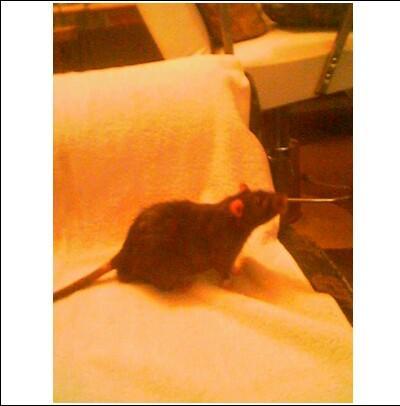 is it a tumor ?
QuestionMurphy
QUESTION: hello sandra i came acr
is it a tumor ?
QuestionMurphy
QUESTION: hello sandra i came acr
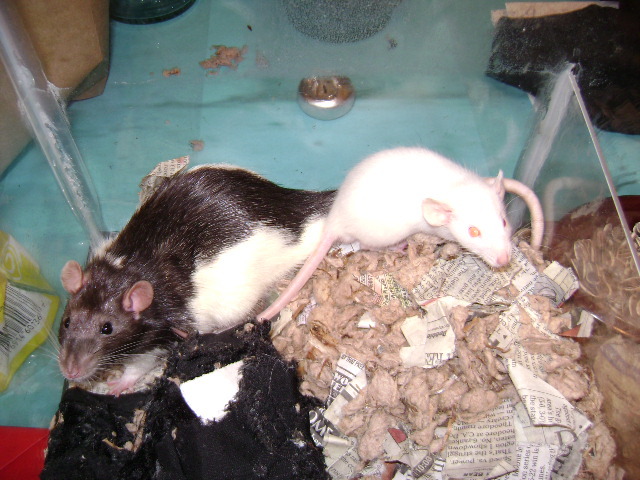 Rat Bully
Question
My boys.
I just have a question about introduc
Rat Bully
Question
My boys.
I just have a question about introduc
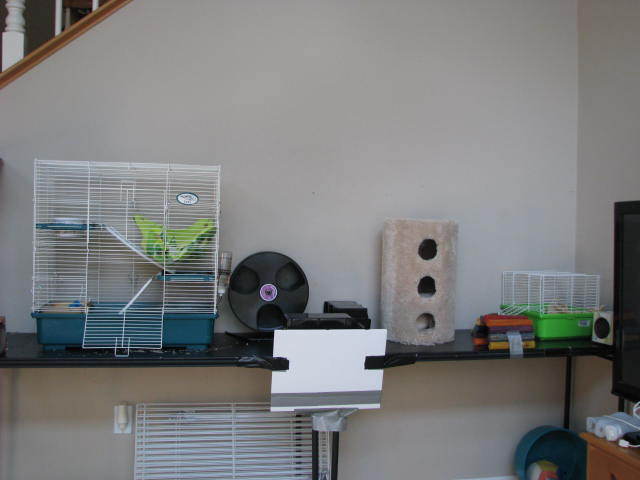 Two Month Old Rat Eats Poop
QuestionQUESTION: Hello, I adopted a brother pair of ba
Two Month Old Rat Eats Poop
QuestionQUESTION: Hello, I adopted a brother pair of ba
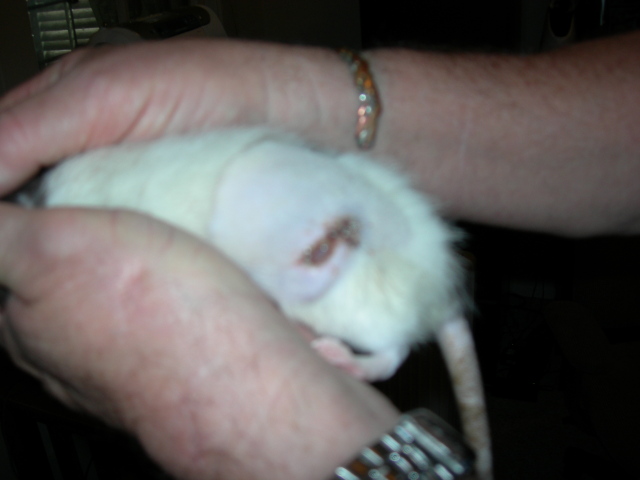 problems following surgery- keeps removing stiches
QuestionQUESTION: My little friend, Patches had surgery
problems following surgery- keeps removing stiches
QuestionQUESTION: My little friend, Patches had surgery
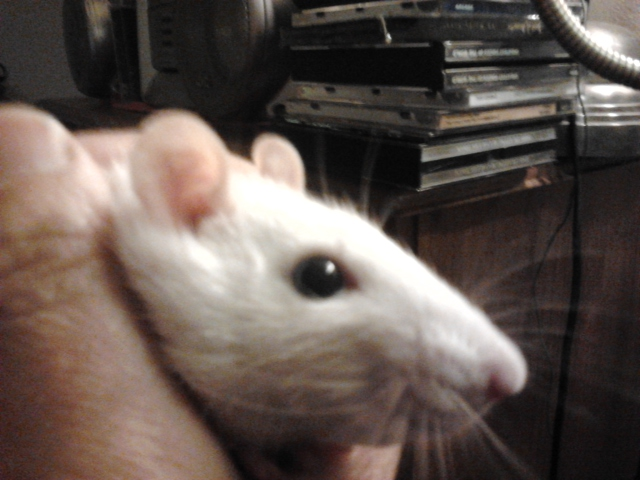 rat eye issue
Question
normal eye bad eye
Hi again nata
rat eye issue
Question
normal eye bad eye
Hi again nata